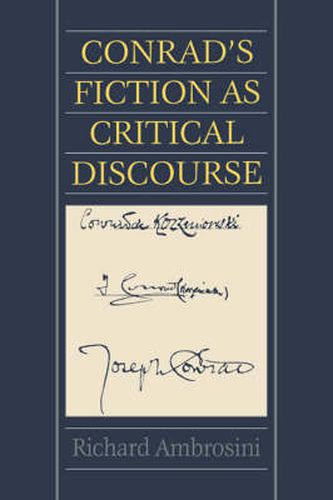Readings Newsletter
Become a Readings Member to make your shopping experience even easier.
Sign in or sign up for free!
You’re not far away from qualifying for FREE standard shipping within Australia
You’ve qualified for FREE standard shipping within Australia
The cart is loading…






Joseph Conrad’s comments about the interpretation of his works have until now been dismissed as theoretically unsophisticated, while the critical notions of James, Woolf, and Joyce have come to shape our understanding of the modern novel. Richard Ambrosini’s study of Conrad’s fiction as critical discourse makes an original claim for the importance of his theoretical ideas as they are formed and tested in the novels themselves. Setting Conrad’s comments in this context of transformations in his narrative forms, Ambrosini defines Conrad’s view of fiction and the artistic ideal underlying his commitment as a writer in a new and challenging way. Conrad’s innovative techniques as a novelist are shown in the continuity of his theoretical enterprise, from the early search for an artistic prose and a personal novel form, to the later dislocations of perspective achieved by manipulation of conventions drawn from popular fiction. This reassessment of Conrad’s critical thought offers a new perspective on the transition from the Victorian novel to contemporary fiction.
$9.00 standard shipping within Australia
FREE standard shipping within Australia for orders over $100.00
Express & International shipping calculated at checkout
Joseph Conrad’s comments about the interpretation of his works have until now been dismissed as theoretically unsophisticated, while the critical notions of James, Woolf, and Joyce have come to shape our understanding of the modern novel. Richard Ambrosini’s study of Conrad’s fiction as critical discourse makes an original claim for the importance of his theoretical ideas as they are formed and tested in the novels themselves. Setting Conrad’s comments in this context of transformations in his narrative forms, Ambrosini defines Conrad’s view of fiction and the artistic ideal underlying his commitment as a writer in a new and challenging way. Conrad’s innovative techniques as a novelist are shown in the continuity of his theoretical enterprise, from the early search for an artistic prose and a personal novel form, to the later dislocations of perspective achieved by manipulation of conventions drawn from popular fiction. This reassessment of Conrad’s critical thought offers a new perspective on the transition from the Victorian novel to contemporary fiction.